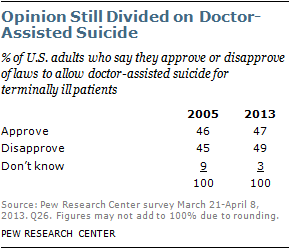 Public opinion on laws that would allow physician-assisted suicide is closely divided, with 47% of U.S. adults approving and 49% disapproving of laws that would allow medical doctors to prescribe lethal doses of drugs for terminally ill patients who choose to commit suicide.
Public opinion on laws that would allow physician-assisted suicide is closely divided, with 47% of U.S. adults approving and 49% disapproving of laws that would allow medical doctors to prescribe lethal doses of drugs for terminally ill patients who choose to commit suicide.
 The opinion divide over this issue is virtually unchanged from a 2005 Pew Research survey. Surveys by Gallup have found a similar, and largely stable, division over whether doctor-assisted suicide is morally acceptable or morally wrong (45% say it is morally acceptable and 49% say it is morally wrong in a May 2013 Gallup poll).
The opinion divide over this issue is virtually unchanged from a 2005 Pew Research survey. Surveys by Gallup have found a similar, and largely stable, division over whether doctor-assisted suicide is morally acceptable or morally wrong (45% say it is morally acceptable and 49% say it is morally wrong in a May 2013 Gallup poll).
There are sizable differences in opinion about this issue by race, ethnicity and religion. More whites than blacks and Hispanics favor laws allowing doctor-assisted suicide.
A majority of white mainline Protestants and about half of white Catholics approve of laws for this purpose. Two-thirds of the unaffiliated also approve of laws to allow physician-assisted suicide. However, majorities of black Protestants, white evangelical Protestants and Hispanic Catholics disapprove of laws for doctor-assisted suicide by about a two-to-one margin or more.
While there are differences among adherents of religious groups on views about this issue, most major American religious groups officially oppose physician-assisted suicide and euthanasia. For an overview of the positions of 16 major religious groups on physician-assisted suicide and euthanasia see, “Religious Groups’ Views on End-of-Life Issues.”
 There also are differences in opinion by education, political party, ideology and the amount of prior thought given to end-of-life issues.
There also are differences in opinion by education, political party, ideology and the amount of prior thought given to end-of-life issues.
Those with more formal education (at least some college) are more apt to approve of such laws than are those with less education.
Democrats and independents are more inclined than Republicans to approve of laws allowing doctors to assist terminally ill patients in committing suicide. Differences in opinion by political party are virtually unchanged since the 2005 Pew Research survey. There are also differences by political ideology, with conservatives less inclined than either moderates or liberals to approve of laws allowing physician-assisted suicide.
Respondents who report having given more thought to their preferences about end-of-life treatment prior to taking the survey are more inclined to approve of laws allowing doctor-assisted suicide than those who report having given little or no prior thought to these issues.
However, there are no significant differences in opinion about laws allowing physician-assisted suicide by gender or age.
 To what extent are opinions about doctor-assisted suicide consistent with beliefs about other issues that relate to life and death? To explore this question, the Pew Research survey also asked about views on capital punishment and abortion.
To what extent are opinions about doctor-assisted suicide consistent with beliefs about other issues that relate to life and death? To explore this question, the Pew Research survey also asked about views on capital punishment and abortion.
Among those who favor the death penalty for persons convicted of murder, a majority (55%) approve of laws to allow doctor-assisted suicide, while 42% disapprove. By contrast, those who oppose the death penalty tend to disapprove of laws that would allow doctor-assisted suicide by a 59% to 39% margin.
There is also a relationship between moral assessments of abortion and opinion about doctor-assisted suicide. Among those who say they personally believe having an abortion is morally wrong, seven-in-ten disapprove of laws allowing doctor-assisted suicide, while 28% approve. By contrast, among adults who say abortion is morally acceptable, eight-in-ten approve of laws to allow doctor-assisted suicide, while a fifth disapprove. Those who say abortion is not a moral issue also tend to approve of laws to allow physician-assisted suicide by a 59% to 38% margin.


